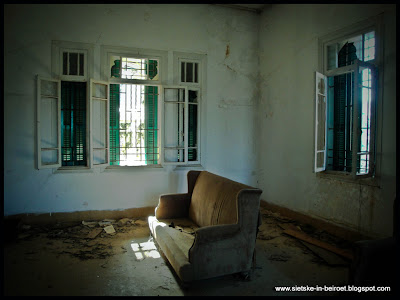I just learned a new word; a feral house. I had heard of a feral cat, which in Lebanon we would call a street cat, or wild cat, but the term ‘feral house’ was new to me. (Learned it here ).
I just found out, because I was googling 'Lebanon + abandoned houses'. Lebanon is teeming with abandoned summer residences. I was in the mountains over the weekend, and on a hike through the woods, I discovered several of them. Many of the feral houses in the mountains above Beirut are monumental villas on large lots, dating back to happier times, i.e. pre-war.
During the civil war many of these houses became inaccessible for a while, and were subsequently looted by people that were obviously on good terms with the local militia that ruled the area. First the furniture would disappear, and the kitchen appliances, and then the doors. They would be stripped of their toilets, sinks, iron railings, marble mantle pieces, wooden door frames and shutters. Everything would vanish, light switches and electrical outlets included, until after some years, all what was left were the walls.
Hubbie’s parental house in Shimlan suffered the same fate. What bothered him most was that his entire record collection was there. They had not yet packed up for the winter (they only lived there in summer), and when the war moved to that village, his parents would not go back to pick up his records. As a teenager, what could be more important than your record collection? Years later, while going through the rubble of the house, he would recognize items from the old days.
This particular house is at the end of a very long and beautiful lane, lined with trees. It comes with a lot of land, pine trees, olive trees and a variety of fruit trees. It's got several buildings on the ground. The house itself orginally had an elevator (2 stories only!), and a fantastic view over the valley! The children of the former owner are spread over the States, France and Rabieh (Lebanon)
War time was not a good time to refurbish your house, and many were left that way with the thought in mind that ‘after the war’, they would be restored to their former glory. However, the war took a little longer than was expected, and owners died. Their children - often dispersed over the globe because Lebanon in those days was not very hopeful and they continued their education and life abroad - do not have the same connection with the house. And what’s more; the finances. The one house we wandered through would need about $350,000 to have the house and grounds restored nicely.
Selling is an option, but there are always a few in the family that don’t really need the money, so they’ll ask a ridiculously high price, which makes properties like this useless for buyers. And so these houses remain empty forever; abandoned, neglected and feral.




4 comments:
I don't know what to say about this. What a waste, a shame..why isn't anything being done about this? I can't imagine having a house like this and not refurbishing it, and just leaving it to rot. What is the purpose of that?
I'm sorry about your hubbie's records..I can imagine it was hard for him to leave behind his childhood memories. As a non-Lebanese, I'll never fully grasp how much the war impacted this country and people's lives..but I'm learning..with every story like this that I read.
Thanks for sharing.
I've seen a lot of those myself and if I have to be completely honest, it's becoming my personal "Lebanese dream" to one day buy one and refurbish it. They're such beautiful buildings.
where is that house with the lane and the elevator?
Thank you
It's a house that lies between Sbaniyeh and Hamana (right outside Sbaniyeh), on the left side of the road.
Post a Comment